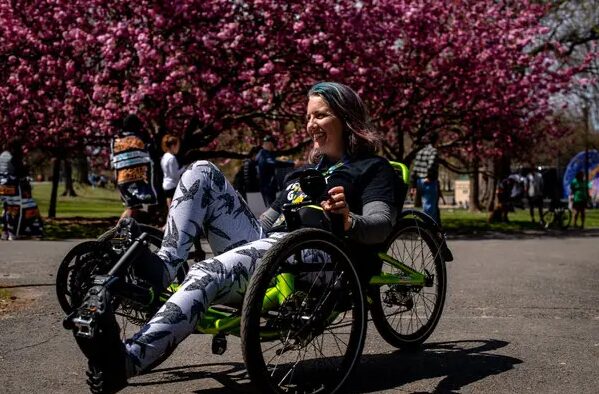In 2022, eight years after her initial diagnosis, Andrea Peet became the first person with ALS to complete 50 marathons in all 50 states. Racing in a recumbent trike, she is the inspiration behind the Team Drea Foundation, a non-profit organization that has raised more than $1 million towards ALS research. Her documentary, Go On, Be Brave, and memoir Hope Fights Back shares her incredible story of resilience. Over the episode Andrea and Brendan discuss how ALS research and awareness has changed over the years due to growing discussions and social media trends like the ALS Ice Bucket Challenge. Andrea details the filming of her documentary and the various challenges faced including Covid, and the writing of her book and how through those mediums she was able to tell her story.
To learn more about Andrea, Team Drea, and ALS research, visit the links below:
YouTube Link for Podcast Episode
Read the Transcript of episode 58 of the AdaptX Podcast with Andrea Peet below
Brendan: Today, I am joined by Andrea Peet. Andrea has refused to let an ALS diagnosis prevent her from achieving amazing things—achievements that we’ll let her highlight in this conversation. Thank you for joining me.
Andrea Peet: Thank you for having me.
Brendan: Prior to your diagnosis in 2014, can you give me a little bit of insight into your athletic and professional background?
Andrea Peet: Yeah, so I was living in Washington, D.C. with my husband. I was working as a city planner, and I had worked up to my first half Ironman.
Brendan: Nice. Where was that located?
Andrea Peet: In Davidson, North Carolina, which is where I went to college.
Brendan: Okay, yeah, Davidson College.
Andrea Peet: Yeah, yeah, yeah.
Brendan: I haven’t ventured into the world of triathlon yet because I can’t really swim, but I always admire the people that can do all three disciplines. How close in proximity was that first 70.3 and your ALS diagnosis?
Andrea Peet: So that was about 11 months before my diagnosis. But while I was training, I realized I was tripping over my toes and my attempts were slowing down. And so I really thought that I was overtraining.
Brendan: So those were kind of the first symptoms that made you think that something was off? And then you were initially diagnosed with probable ALS. For people who aren’t sure about the process, what is the process of getting diagnosed with ALS? What’s the testing that they do?
Andrea Peet: It’s really about ruling everything else out, especially for someone who is so young. And so I had an EMG, which is a nasty exam with thick needles. And, you know, following other tests like online assessments, and then it’s confirmed by diagnosis several months later.
Brendan: Yeah. Initially, other possibilities were ruled out, which led you down a different road. You tried to look for other neurological diseases, but eventually, as more symptoms showed up, they confirmed ALS.
Andrea Peet: Yeah.
Brendan: What was the emotional reaction to receiving that diagnosis for you and your husband?
Andrea Peet: I remember walking out of the hospital, and I was walking and I was talking and I could still eat. And so I realized if there was anything I really needed or wanted to do in this life, I needed to get a move on before my body failed me.
Brendan: Yeah, so typically, the progression of ALS is within the first few years, correct?
Andrea Peet: Yeah, up to five years is the average life expectancy. And in that time, you become paralyzed and are unable to eat or speak and eventually unable to breathe.
Brendan: Yeah. But yours was 10 years ago, so is there a way that doctors are able to quantify the progression of the disease? And do you have any idea why you’ve been able to double the expectancy?
Andrea Peet: They really just wait and see how that person progresses. For me, I can say without a doubt that my slow progression and my exercise, including swimming, has helped me stay stronger than I would have been.
Brendan: Yeah, I saw some videos about you and your mom swimming together and how essential that’s been to your health. Somewhere within that time frame, you started recumbent biking, riding on a recumbent trike. When did the idea to complete a marathon in every state come to mind? Was there anything specific that influenced it?
Andrea Peet: I wanted to do one last race, and that was really supposed to be my last and final race. But when I was the last person to finish by over an hour, I realized that I could use my story to raise money for ALS research and inspire others to take on a race they weren’t sure they could do. That was the initial spark. I worked up to a marathon on my trike within a year, but it wasn’t until I hit the five-year mark when I decided to take on a marathon in every state. I reached the average life expectancy for ALS, and I thought, “I’m really tired of waiting around for the disease to kill me. I’m going to use my time to live, set goals, and just go for it.”
Brendan: Yeah, you definitely haven’t been waiting around. So you recently completed the 50th marathon, correct?
Andrea Peet: Yeah, and I’m 42 now.
Brendan: That’s incredible. Do you have a next goal in mind?
Andrea Peet: My next goal is to do the TCS New York City Marathon, the largest marathon in the world, this November.
Brendan: That’s awesome. You also started Team DREA as a way to fundraise for ALS research, and you’ve raised more than a million dollars. Do you know what those donations have funded?
Andrea Peet: We use our money to fund early-stage ALS research. Because ALS affects people differently and has many causes, we want to use our money to fund innovative ideas and new approaches to curing ALS or making it a livable disease.
Brendan: Absolutely. Where in the U.S. is groundbreaking ALS research happening?
Andrea Peet: We support the ALS Therapy Development Institute in Watertown, Massachusetts. They are the first and largest nonprofit biotech lab focused on ALS research, and about 89% of the money we donate goes directly into their lab.
Brendan: That’s incredibly important research. I’m in Massachusetts, so we’ve always been fortunate to have some of the best hospitals in the world. Very grateful for that.
[Podcast Sponsor Break]
Brendan: For anyone interested in learning more about Team DREA or supporting the organization, where would you recommend they go?
Andrea Peet: Teamdrea.org. You can join us and take on a race of your own to appreciate what your body can do and to race in honor of someone who can’t use their body anymore.
Brendan: Absolutely. Thank you, Andrea, for sharing your story. It’s truly inspiring. And thank you to our listeners for tuning in. If you enjoyed today’s episode, please leave a rating or review on your preferred platform. To learn more about AdaptX and our mission to create inclusive fitness environments, visit www.adaptx.org.

